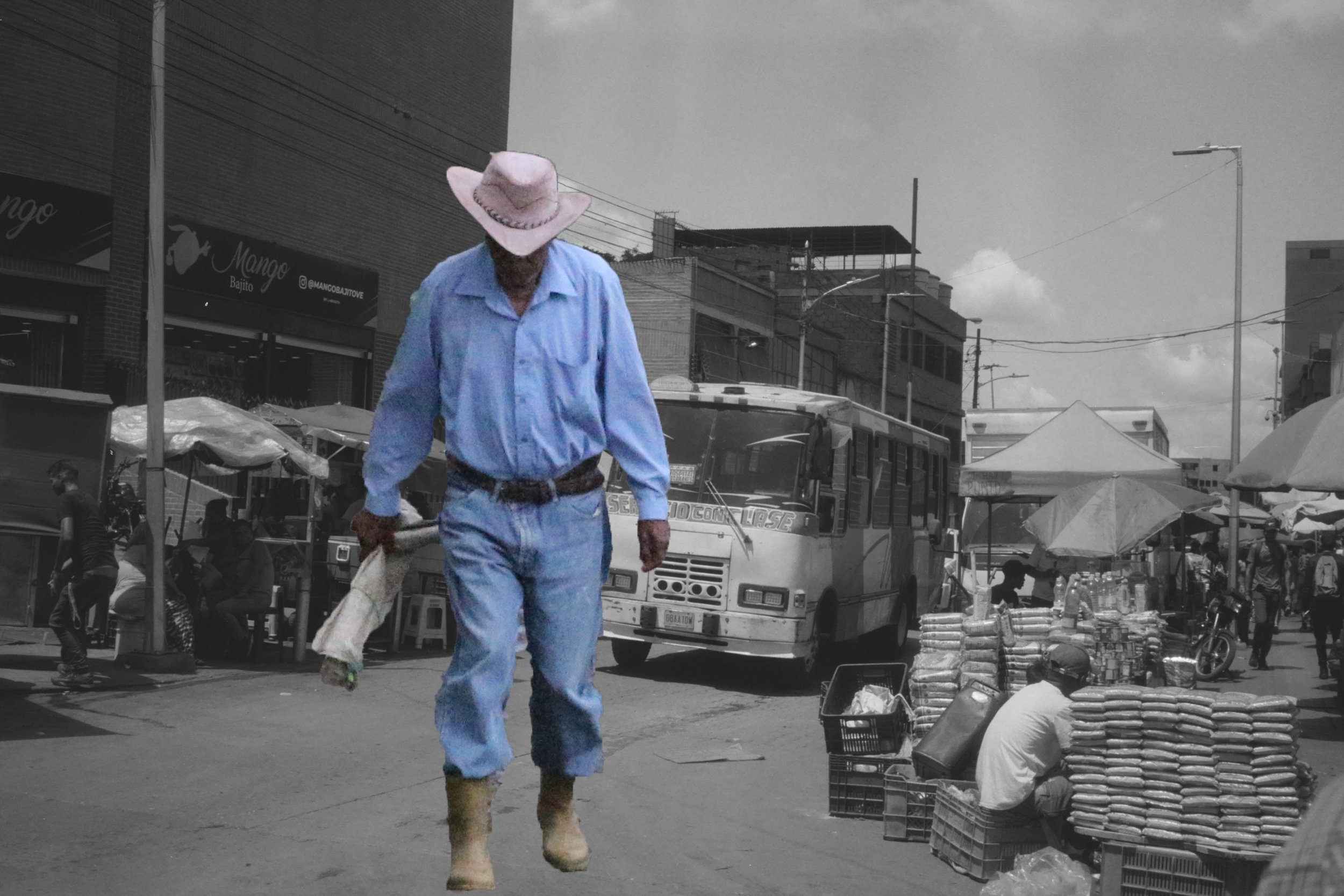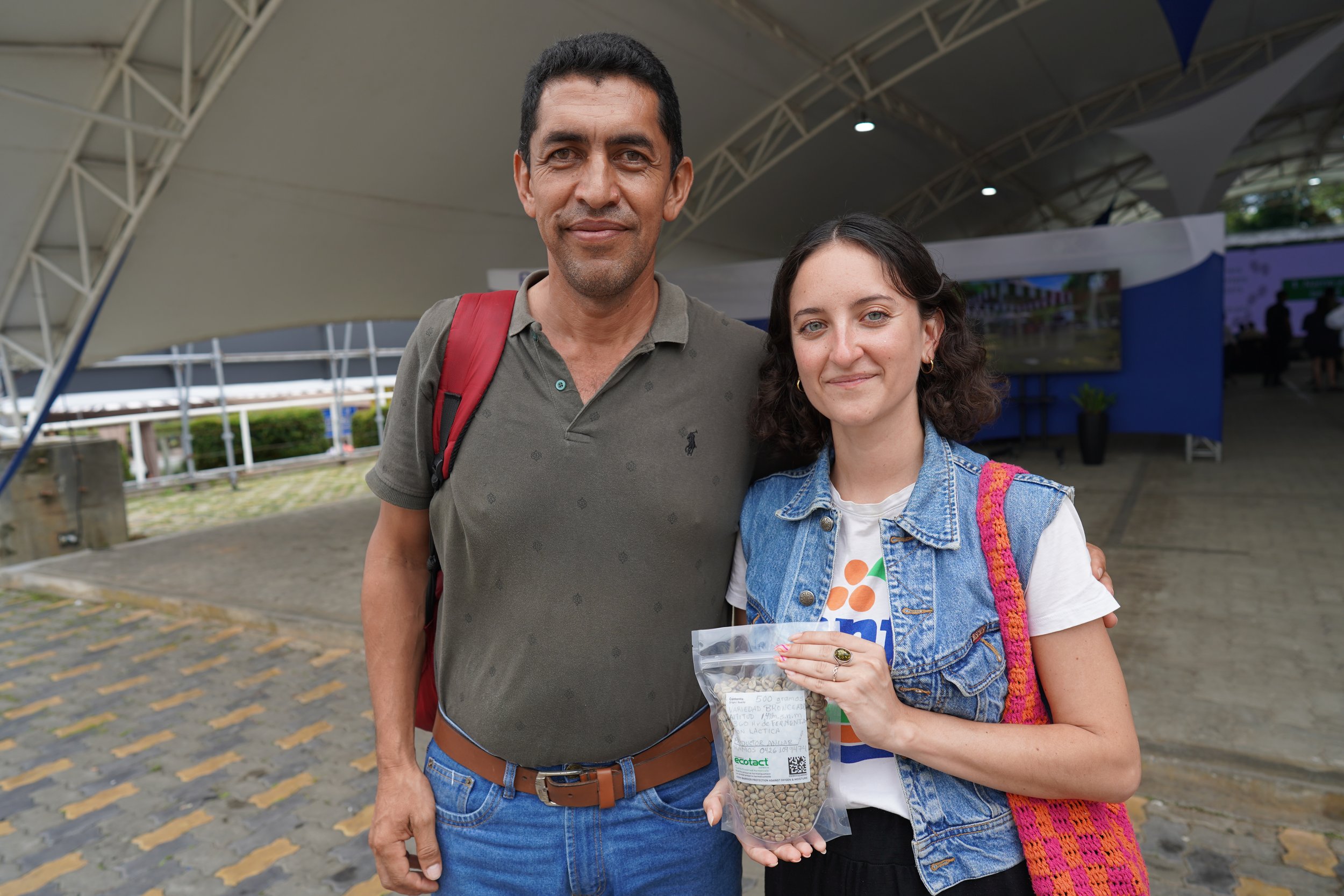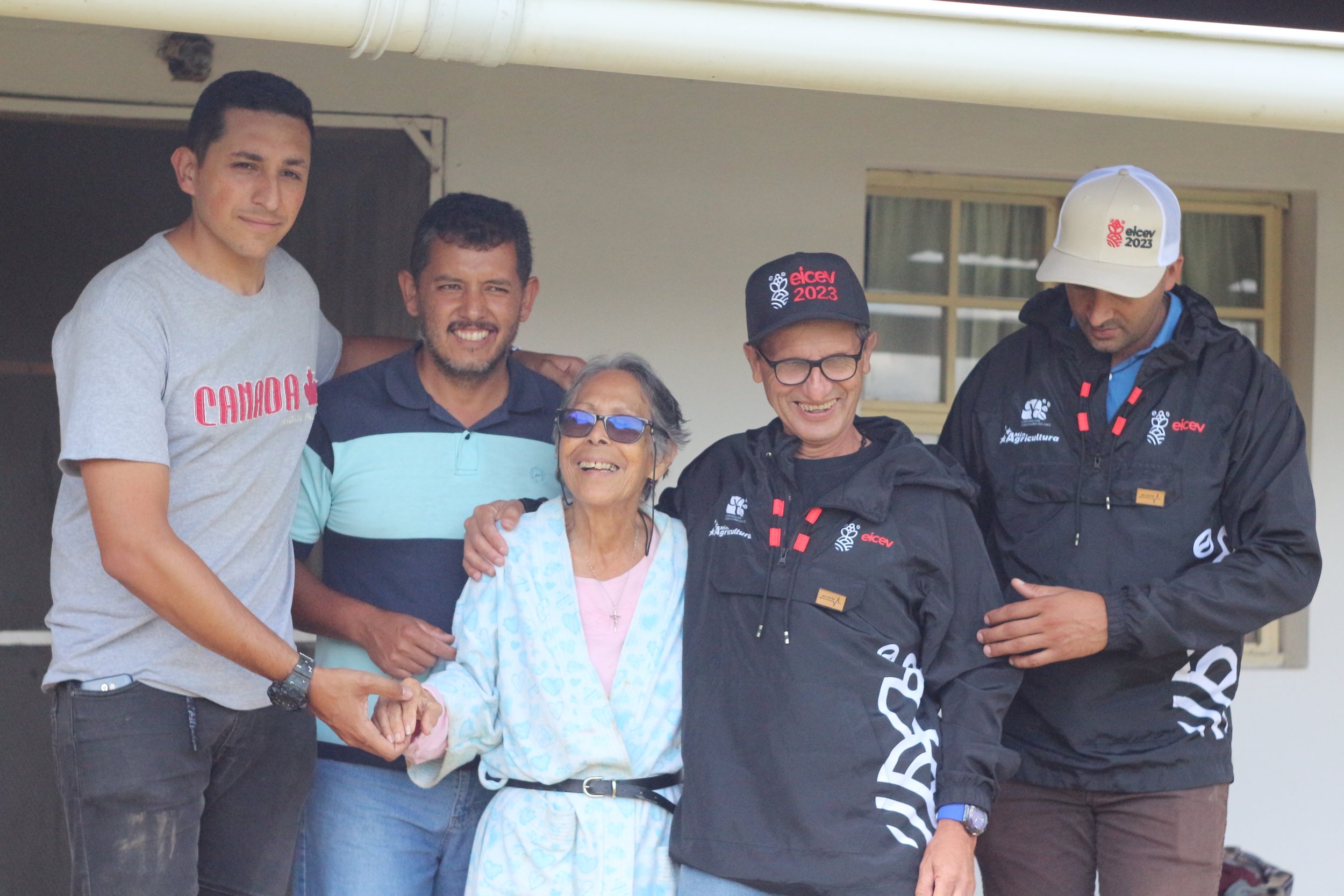
Beautiful encounters are difficult to sum up. Our goal is not to give an exhaustive account of everything that happened to us during our three months in Venezuela. That would be impossible. By the way, in between all these adventures, Juan repaired his grandfather's Beetle. It's a car in which we've been able to make some great trips. It took us a long time to get it up and running, but the sacrifices paid off. The day I saw Edwin for the first time, Juan couldn't make it, but it was worth it afterwards. It was at Cospe café that I met Edwin. He couldn't stay very long, but I was able to have a good chat with him. One important piece of news was that he had put an end to the Trinidad project with his cousin. So we would no longer be able to go to the farm we had known. But there was a big new project in the pipeline that made me very happy. A project to gather coffee cherries from different growers and process them in a post-harvest processing center to bring out the sensory attributes of the selected coffees. Edwin continued to experiment with fermentation processes. We parted quickly, but he left me a dose of coffee. I was going to be able to prepare it at home, and was looking forward to the moment when I could enjoy it with Juan. The picture was complete, but not in the way we'd hoped. Things can change, but we couldn't have anticipated this separation.
chapitre 15

Victor Montilla, whom we had met at the Brewing Championship, invited us to have coffee with him. We met at Savignano café. It's a coffee shop offering fine Venezuelan coffees. Including Victor Montilla's. We were in the company of a fourth-generation coffee producer, drinking his coffee at the same time and at the same table. We wanted to meet him, get to know him and hear his whole story. His father had given up the family farm, no longer believing in the coffee boom or in any profits to be made from coffee production. Victor Montilla bet on this farm and its know-how. Above all, on continuous learning to achieve quality. And he hopes with all his heart to get recognition for this year's harvest. I tasted his coffee blind throughout the selection process for the best coffees. We were waiting to see what ranking he would get in a few days' time, when the final announcement of the international meeting of specialty coffees was made. He places great value on the ecosystem and listening to his plants. For him, plants express themselves and, with experience and patience, he manages to understand what they need. This is the first harvest he's really proud of. In a few days, he would find out just how much his work would pay off.
The day had arrived.
The producers had arrived. They were coming to the capital to receive their awards. We wanted to be there and meet them. I was thrilled at the idea of being able to put faces to the coffees I'd spent weeks tasting, evaluating and appreciating. I wanted to meet them all, chat with them, drink coffee with them, listen to them above all. To listen and absorb their know-how, their love of what they do. Coffee. I think there's a growing culture around coffee. Good coffee awakens ideas and thoughts. When you like specialty coffee, your consumption is dictated by this culture. The baristas and roasters I love are the ambassadors of this culture, which is playing an increasingly important role in my life and Juan's. But the producer, the most important link in the chain, is the coffee maker. But the producer, the link furthest away from us when we drink our coffee in our local coffee shop, is the real expert in the field. The one who knows exactly what he's doing. The one who has a direct link with the land that gives birth to these plants and fruits. Growing coffee is one thing, knowing how to make good coffee is another. If the two came together, perhaps we could have some interesting discussions aimed at resolving certain issues? We've come to the right place.

The program was packed. Conferences were organized throughout the day. Each speaker brought his or her own expertise to bear on the subject of coffee. And the speakers were sure to inspire envy. When we arrived, there were people swarming all over the place. It's in the conference area that we try to get to, and on the way we bump into friends and colleagues. The conferences have already started and the room is packed.
Next to me sit three gentlemen, wearing hats and looking very handsome. They introduce themselves. They're producers. Their coffees are part of the selection. Their names are Juan, Roney and Marcelino. They produce in Bocono. Juan is only 23, but he's determined to dedicate his life to coffee, to the family farm. His parents advised him to study and not give up everything for coffee, having witnessed the decline of coffee production in their time. He did so to reassure them, but his direction was clear from the start. He likes to learn new things every day. He's aware that he's missing out on a lot of learning. But he likes to surround himself with his colleagues. Local growers. He follows the advice of growers already seasoned by experience. He understands the need to help each other in the business, and that's what he likes too. For my part, I tell him about my humble project to promote Venezuelan coffee. He promises me a sample of his coffee. I feel immense joy and gratitude.
Attending the program conferences with the producers is like attending the need to learn. There's a sincere willingness on the part of growers to listen, retain and apply what these speakers come to pass on. Although the grower is an expert and master of his own land, his own operation, there is an enormous humility. In Venezuela, we're only at the beginning of the move towards specialty coffee. There's a lot of learning to follow and corroborate over time. Consistency will enable us to establish our skills. Jesus Salazar, the cafeólogo behind the cafeología sourcing and roasting project in Mexico, was one of the speakers. Listening to him was a great opportunity for me too. I really admire his work with coffee and producers. His approach is focused on quality as much as on the ethical values he wishes to convey in coffee. He also goes to the root of definitions. It's interesting to think about the difference between a peasant and a farmer. Do you know it?

For Bilal El Ayoubi, the quest for quality in the cup goes hand in hand with tolerance to disease and pests in coffee. The creator of the Venezuelan varieties monte claro, araguaney. These are varieties derived from crosses with other varieties. They have the particularity of being designed to adapt to the country's soil and climate. During the conferences, some on coffee growing, others on the history of coffee. There's a lot going on at the same time. Just as we got to know Juan Cruz, we also got to know other producers. Some of them were celebrities we were hoping to bump into, and exchange what we could well exchange, knowing that they'd be in great demand afterwards. We were in for some very pleasant surprises. José Pereira and Reynaldo Mujica are producers made famous in René Orellana's coffee shop. They produce differentiated batches of coffee. We knew them by their coffee, so we wanted to meet them in person. They warmly opened their doors to us. Talking to them, we could already imagine ourselves on their farm, among the plantations, under the shade of the trees. They are two long-time friends who grow coffee together on the La Peñita farm. They also run the Laurel experimental station, which belongs to one of the leading university. La Peñita is located half an hour from Caracas in the neighboring state of Miranda. When they invited us, we could just imagine the ladybug arriving at the farm.
Travelling and visiting farms is what we wanted to do most in the world. Visiting Juan Carlos Mujíca's farm confirmed this need and desire to discover coffees from their place of origin. But when it came to EICEV, that event full of excitement, all I could think about was making the most of the moment. Sure, it was in Caracas. But it was also an opportunity to meet and talk with people we already knew and those we hadn't yet met. So there was work to be done. By the time we met Francisco Rosales, our perspective had changed somewhat; we no longer had in mind the departure for the mountains before our imminent return to France - there were only two weeks left before we had to catch the plane again -. Francisco is a coffee grower in Boconó too. I can't remember exactly how the conversation evolved, but I do know that at one point Francisco was really keen for us to visit his farm. For him, we had to go to Boconó to visit the farms. He'd take us to see his farm and get to know the others too. But he wanted us there after the event. It was an electric charge. Clearly, we wanted to go. We had a car that was up to standard, or nearly so, and most importantly, a warm invitation. Boconó is at least 8 hours from Caracas. So a small part of us was dubious: rationally, were we going to be able to get to Boconó by car? How long would the bus take? Would we have time to get ready and get back to Caracas in time for our flight? There were a lot of questions. But in all honesty, the excitement was already building. We were getting closer to putting Juan's grandfather's Beetle to the test. Meeting Francisco had been decisive, and it was he who really got us thinking about what we wanted to do.

And this encounter led to another. That of Ligia Báez, an octogenarian who has been running her coffee farm with her husband for years. He's French, originally from the Dordogne, and in love with Venezuela's Andes mountains. It's one of the few farms to be entirely organic. Ligia is a pediatrician by training, she loves children and everything scientific, methodical and clean too. She works with coffee with a scientific approach and a lot of love. She puts a lot of emphasis on doing things with love and care. She's an inspiring woman. It's almost impossible not to fall under this lady's spell. You can talk to her for hours and be moved, and then just laugh out loud. Coming to Caracas was important to her, although she would have gladly stayed in her coffee mountains. It's nerve-wracking to travel so far and to be constantly going back and forth from accommodation to the show. But it's important. For her, her children and the team behind her. Coffee is a team effort. In a few hours, the results would be in. Ligia, Francisco, Juan, José, Reynaldo, Victor and all the others would know just how much their coffee would be rewarded. It's certainly recognition enough to have reached this stage of the competition - the hard work has paid off. But auctioning off the best coffees would enable growers to recoup the costs of producing high-quality coffee, and perhaps even invest for years to come.
Currently in Venezuela, Juan and I are witnessing the beginnings of specialty coffee. Producers are going in the right direction. Ethics and morality are becoming increasingly important. The land is valued, exploited and preserved. What's needed now is consistency, so that the quantity can be representative of the potential quality of this terroir. The aim is for every producer selected for his coffee to be selected next year and in ten years' time. Because you learn from year to year, harvest to harvest. And in ten years' time, many things may change, but specialty coffee will continue to be a sector that is constantly seeking to improve, to ask itself the right questions. it's a sector whose approach is virtuous in the face of economic, social and ecological challenges.

When their names were announced, the cheers of the producers were enough to bring tears to our eyes. You could tell they hadn't come to the event alone. Often, their families were with them. And when they heard the names of their farms, they were jumping up and down, hugging and shouting. It was joy in every form of expression. Coffee growing is a family business. And even more than a business, it's a lifestyle in many cases. Not all. But often, living on a farm, whether by choice or not, means living to the rhythm of the coffee trees. The cycles dictate the highlights. There's good reason to jump up and down when the harvest is good. And even more so when you can exchange it for a generous sum of money. Ligia, Juan Cruz, Ricardo Garcia, Fernando Pedroza, Francisco in third place and Victor Montilla in first place received more than fair remuneration for their coffees, and we'd go and visit their farm a few days later, even if at that moment of total euphoria we didn't know it yet.
The producers had all the spotlights on them. Generous sums of money soared at the coffee auction. Even better, the buyers were local as well as international. Jérémie, training manager at Belco for 8 years and now roaster at Piha café, was one of them. It was very tempting to take one of these coffees home with you. You knew they were good, you'd definitely tasted them. But all these encounters, the journey of these producers, having them here and talking to them, gave us something to talk about. and in the end, that's what I love about coffee. The story that goes with it too. Good coffee gives us the opportunity to connect with each other, with the earth. With the human beings behind the coffee. Jérémie was at the buyers' table ready to head back to Bordeaux with one of the best coffees of this harvest. It's a situation that's hard to describe, and even I feel as if I've witnessed an unreal scene. It's as if it had been a far-fetched dream, yet it seems real. When you start to tell it, you realize that it has neither head nor tail. Well, in the case of this auction, the stakes were high for the producers. It was an opportunity to sell a bag of the best coffee you've ever produced at the highest possible price. In short, the whole room was in total euphoria. Shouts came from all directions, motivating the buyers to bid ever higher. The producer in front of the buyers' table, in tears. Myself, in tears. Because the moment was beautiful. I'd never had the chance to witness anything like it.
Jérémie managed to buy some coffee. It will arrive in Bordeaux and I hope the people who taste it will appreciate all that's behind it. In the end, the EICEV, the auction and all that may be the final confrontation. The confrontation between producer and consumer. The meeting of two worlds. And to witness the allegory is an incredible opportunity. Juan and I sincerely hope that these stories reach people looking to taste Venezuelan coffee. More stories to come very soon. More focused on our travels and farm visits.
See you soon!

Photo credit :
Pierre Wolf-Mandroux (1,2,5 et 6)
Mélissa Pelgrain (3 et 4)
